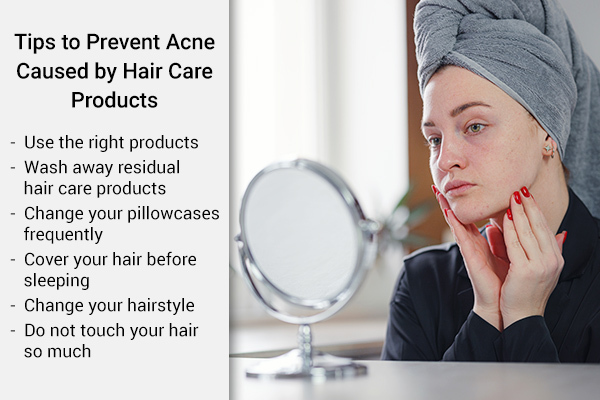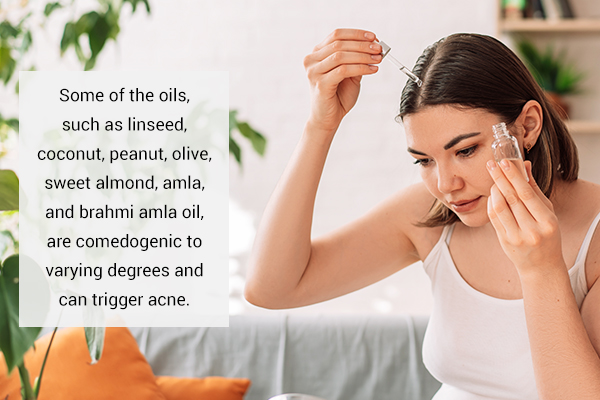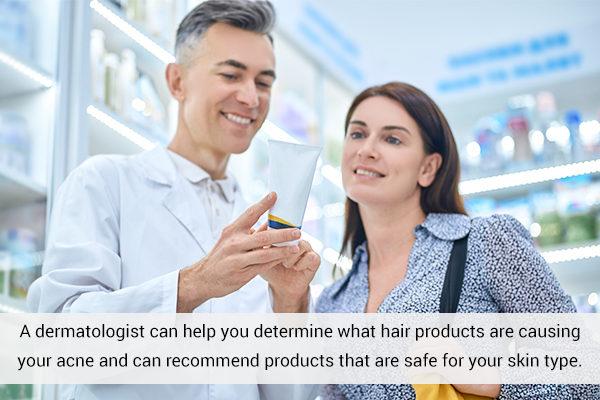In this article:
Acne is a common skin condition that affects millions of people worldwide. It is characterized by the presence of pimples, blackheads, and whiteheads on the skin. (1)

Acne can affect any part of the body, including the scalp, face, and back. Several factors can contribute to the development of acne, including hormonal changes, genetics, and lifestyle factors such as eating a lot of carbohydrates or being very stressed. (1)
Hair products are also considered possible causes of acne. Acne cosmetica is a medical term that refers to breakouts caused by the application of skin and hair care products, and it is a common occurrence even among those who have never experienced acne before. (2)(3)
If your hair care products are to blame, you may notice the emergence of whiteheads and small flesh-colored bumps known as papules on your hairline, forehead, or neck.
This article will examine whether hair products can cause acne and will explore the scientific evidence behind this claim.
How Can Hair Products Cause Acne?
Hair products have the potential to trigger acne breakouts in a few sneaky ways.
First, the oils in these products can easily transfer to your skin. This can lead to clogged pores and, ultimately, acne flare-ups.
Second, some hair care products contain comedogenic ingredients, which means they have a tendency to block pores. The real issue arises when these products accidentally end up on your skin while you’re applying them to your hair, especially near the hairline. (3)
Additionally, if you touch your hair and then your face, you can transfer the products to other areas of your skin.
Hair products can also come into contact with your skin through your pillowcase. When you sleep, the products can transfer onto your pillowcase, and when you move during sleep, your skin can pick up the residue. (4)
Ingredients That May Contribute to Acne
Certain ingredients commonly used in hair care products can contribute to the development of acne. It’s essential to be mindful of the ingredient list in hair products and avoid those with high amounts of comedogenic substances.
Keep an eye out for and steer clear of the following ingredients if you are prone to acne: cocoa butter, lanolin acid, oleic acid, oleyl alcohol, and isopropyl palmitate or myristate. (4)(5)
Additionally, some ingredients may irritate the skin and contribute to acne formation, such as petrolatum, silicone, sodium lauryl sulfate, jojoba oil, and lanolin. (6)
Even alcohol-based (4) hair sprays can be culprits, causing breakouts if accidentally sprayed onto nearby skin. Similarly, thick pomades can be blamed for acne, which is why they have become less famous nowadays in the cosmetic industry. (6)
Note: These acne-inducing bumps can sometimes be hard to notice until you experience many tightly packaged bumps that finally become visible.
Prevention of Acne From Hair Care Products

To prevent acne caused by hair products, keep the following in mind.
1. Use the right products
Choose the right products. If you’re unsure about the product responsible for your breakouts, it’s advisable to discontinue the use of any product that lacks the following words on its label: “won’t clog pores,” “oil-free,” “non-comedogenic,” and “non-acnegenic.” (2)(3)
Discontinuing the use of pore-clogging products can help clear acne gradually. It is often straightforward to identify the products responsible for breakouts, for instance, oil-rich hair styling products such as pomades.
A wide range of hair care products such as shampoos, conditioners, styling gels, waxes, pastes, and sprays may contain oil, which can potentially cause acne. (2)
2. Wash away residual hair care products
To achieve clear skin, it’s crucial to eliminate any residue left by hair care products, which can adhere to almost anything. It’s essential to wash all items that have come into contact with your head, such as pillowcases, sheets, hats, caps, headbands, and visors. (2)
3. Implement lifestyle interventions
Here are some important habits you should adopt to reduce the chances of developing acne from hair care products.
a. Change your pillowcases frequently
When you sleep, hair products can rub off on your pillowcase and then transfer to your skin. Changing your pillowcase frequently reduces the likelihood of these products coming into contact with your face. (4)
b. Cover your hair before sleeping
Covering your hair with a scarf or bonnet before going to bed reduces the amount of hair-to-skin contact, which can help prevent the transfer of leave-in hair products to your skin. (4)
c. Change your hairstyle
Certain hairstyles, such as bangs, allow your hair and leave-in hair products to regularly touch your face. Opting for hairstyles that minimize hair-to-face contact can reduce the chances of comedogenic ingredients from hair products causing acne. (4)
d. Do not touch your hair so much
Touching your hair can transfer leave-in hair products onto your hands, which can then transfer to your face if you touch it. Avoiding touching your hair can help prevent this from happening. (4)
Can Hair Oils Also Cause Acne?

Many people use oils to protect their hair from damage and add shine, as some oils can help repair dry and damaged hair. (7)
However, some of these oils, such as linseed oil, cocoa butter, coconut oil, peanut oil, olive oil, sweet almond oil, amla oil, and brahmi amla oil, are comedogenic to varying degrees and can trigger acne.
Individuals with acne-prone skin are advised to avoid using these oils. If it’s unavoidable, it’s important to be cautious when applying them to the hair and to avoid contact with the skin around the hairline. (4)(5)
How Long Does It Take for Hair Products to Cause Acne?
The length of time it takes for hair products to cause acne can vary depending on the individual and the specific products used. Some people may experience acne breakouts within a few days of using a new hair product, while others may not notice any changes for several weeks.
It is important to pay attention to your skin and to stop using any products that are causing acne breakouts.
How Do You Know Your Acne Is From Hair Care Products?
If hair care products are responsible for your acne, you may notice the appearance of papules, small flesh-colored bumps, and whiteheads on your forehead, your hairline, or the back of your neck. (2)
ALSO READ: Top 7 Kitchen Ingredients to Fight Acne
Consulting a Dermatologist

If you think your hair products are causing acne, it is a good idea to see a dermatologist. A dermatologist can help you determine what hair products are causing your acne and can recommend products that are safe for your skin type.
They can also provide you with advice on how to properly care for your skin and prevent acne breakouts in the future.
Most-Asked Questions
What ingredients in hair products should I avoid if I have acne-prone skin?
If you have acne-prone skin, avoid hair products that contain ingredients such as oils, silicones, and certain types of alcohol. These ingredients can clog pores and cause acne breakouts. (4)
Will petroleum jelly cause acne too?
Petroleum jelly (Vaseline®) is a widely used ingredient in various cosmetic and hair care products. Previous studies suggested that petroleum jelly could clog pores, but recent research has concluded that it’s safe for individuals with acne-prone skin. (4)
How can I prevent acne breakouts caused by hair products?
To prevent acne breakouts caused by hair products, you should choose hair products that are labeled as non-comedogenic. You should also avoid touching your face or rubbing your hair against your face, as this can transfer hair product residue to your skin. (4)
Final Word
Hair products can cause acne breakouts in some people, particularly those with acne-prone skin. Some ingredients in hair products can clog pores, irritate the skin, and lead to acne breakouts on the face and body.
To prevent acne breakouts caused by hair products, it is important to choose products that are labeled as non-comedogenic and are formulated with ingredients that are safe for acne-prone skin.
If you have persistent acne breakouts, it is important to see a dermatologist who can help you determine the underlying cause and recommend effective treatment options. By being proactive about your skin care and avoiding products that can cause acne breakouts, you can achieve clear, healthy skin.
- Was this article helpful?
- YES, THANKS!NOT REALLY


